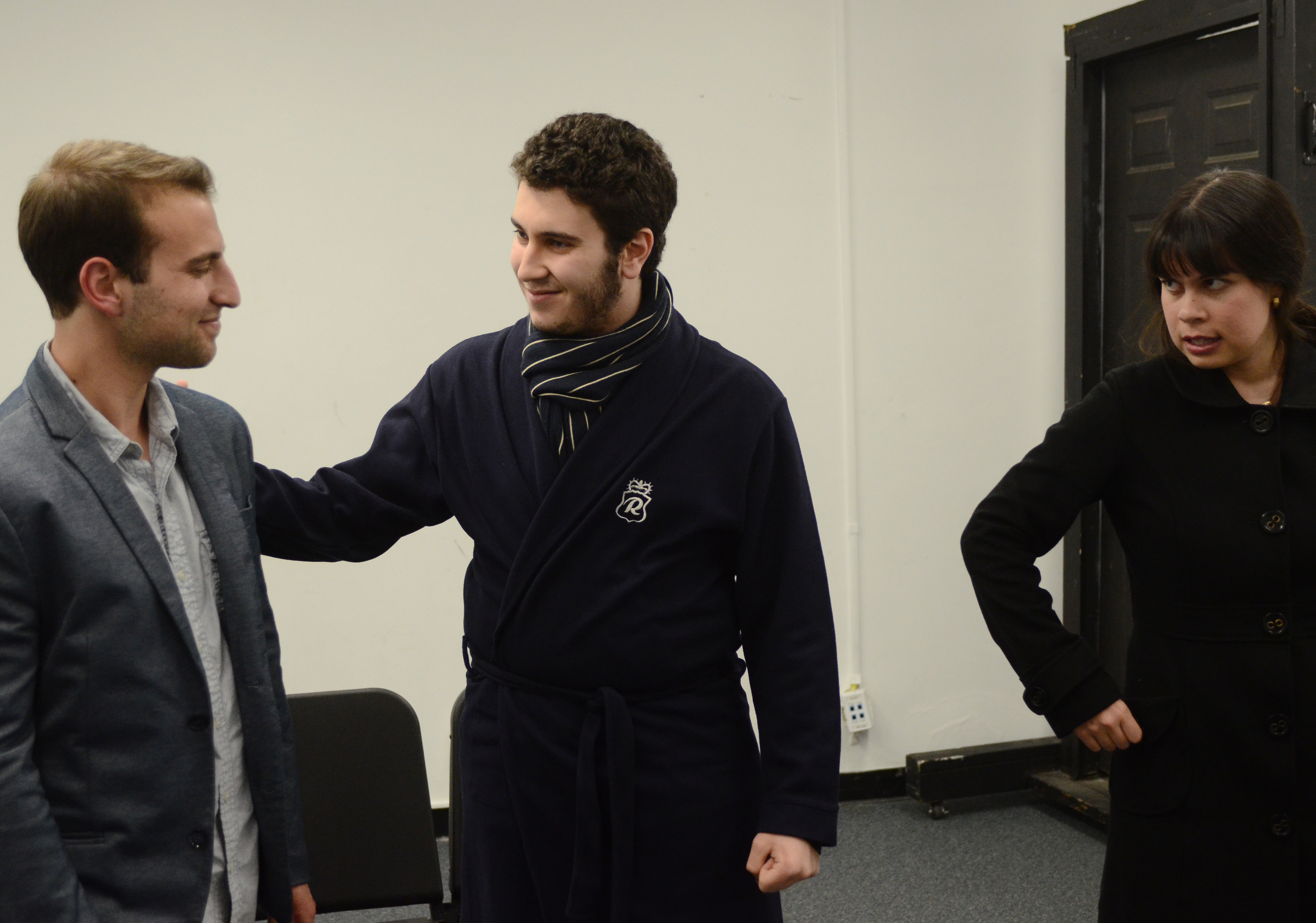Shakespeare at UCLA’s production delves into marriage, comedy

Eryk Waligora (left), Kareem Barghouthi (middle) and Phoebe Singer (right), members of Shakespeare at UCLA, rehearse for their Winter One Acts performances. These performances will take place on Saturday at Royce Hall and will explore the comedic nuances of engagement and the disillusionment that follows.
Winter One Acts
Saturday, 8p.m.Royce 314
FREE
By Natalie Chudnovsky
March 1, 2013 12:00 a.m.
The original photo caption contained an error and has been changed. See the bottom of the article for additional information.
Property disputes, shouted insults and a near death. It may be scripted, but it’s far from an ideal proposal. But then again, little goes according to plan when marriage is on the table.
Shakespeare at UCLA presents the Winter One Acts: Anton Chekhov’s “The Proposal” and Percival Wilde’s “The Sequel,” which explore the comedic nuances of engagement and the disillusionment that follows. This is Shakespeare at UCLA’s first non-Shakespeare production this year.
Kat Ignatova, a third-year classical civilization student, as well as a Daily Bruin designer, said she had the idea of branching away from Shakespeare and putting on the Winter One Acts. She approached Leland Frankel, a first-year theater student and fellow Shakespeare at UCLA veteran, about collaborating. Frankel said he saw parallels between these plays and Shakespeare’s comedies.
“It’s about love and loss of love,” Frankel said. “‘Midsummer Night’s Dream’ is basically this but drawn out for two hours.”
Robert Watson, a first-year theater student, said acting in “The Sequel” has provided comedic relief from his role in Shakespeare at UCLA’s current production, “King Lear.” A 25-minute one-act play fits more easily into the directors’ and students’ busy schedules, Watson said.
But Frankel said he doesn’t see the play’s short length as reason to take a relaxed approach. He said it’s like a short story, so the emotional arcs need to be tight and concise.
“You have to keep the energy and the creativity that you would bring to a full play with multiple scenes and compact it,” he said.
Though “The Proposal” is traditionally set in 19th-century Russia and “The Sequel” takes place in 1920s America, the plays pair well because they share recurring themes of love and marriage, as well as a highly comedic approach, Frankel said. “The Proposal” follows the hapless Lomov, played by fourth-year history student Eryk Waligora, as he attempts to propose to his neighbor’s daughter Natalya, played by Phoebe Singer, a fourth-year theater student. The play explores the absurdity of romantic motivations and the notion of marriage as tied to property, Waligora said.
“Everyone understands these recurring themes, like when Lomov says, ‘If I wait until I actually fall in love, I’m never going to get married,’” Singer said.
“The Proposal” will be followed up by Wilde’s “The Sequel.” It’s not a sequel to “The Proposal” specifically, but rather a sequel to all plays that end with the prospect of marriage.
“It makes fun of the fact that the audience takes pleasure in seeing two people finally get together in the end, and it addresses that this is just audience bait,” Ignatova said. “Really these characters wouldn’t work out. The author has just ended it at a good place.”
The play opens right after a proposal has been made, Watson said. It mocks Shakespearean comedies and the high-flown 19th century dramas that were neatly resolved with engagements.
“It’s relevant to anyone who’s ever looked at their significant other and realized, ‘Maybe this person isn’t who I thought they were,’ for better or for worse. That is where the comedy in this show comes from,” Watson said.
The protagonists are named “He” and “She” to mock the interchangeability of the stereotypical protagonists in that genre, Watson said. The play’s brevity is also a jab at its traditionally romantic predecessors.
“It’s a joke, that the two hours to build up the relationship is much more work than the half an hour that it takes for it all to fall apart,” Watson said.
Despite their length, or perhaps because of it, both plays pack a lot of content and humor, Frankel said.
Both plays subvert viewer’s expectations on what romantic comedies should be and how their characters should act, Frankel said. The characters act in illogical ways even when their problems could be resolved by being straightforward about their intentions.
“I’ve always liked comedies of error, and this is one big error,” Frankel said.
Correction: Eryk Waligora (left), Kareem Barghouthi (middle) and Phoebe Singer (right), members of Shakespeare at UCLA, rehearse for their Winter One Acts performances.


